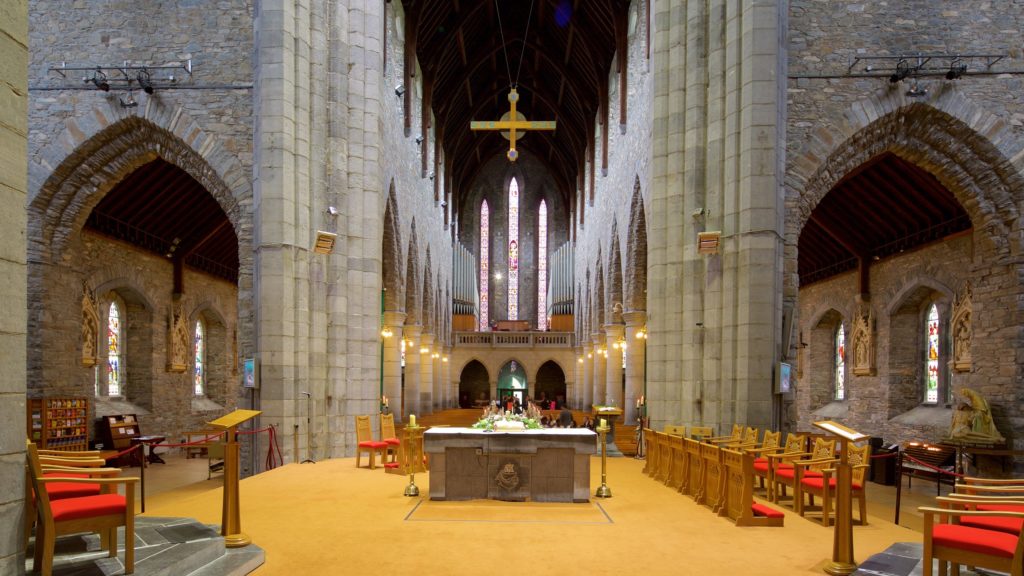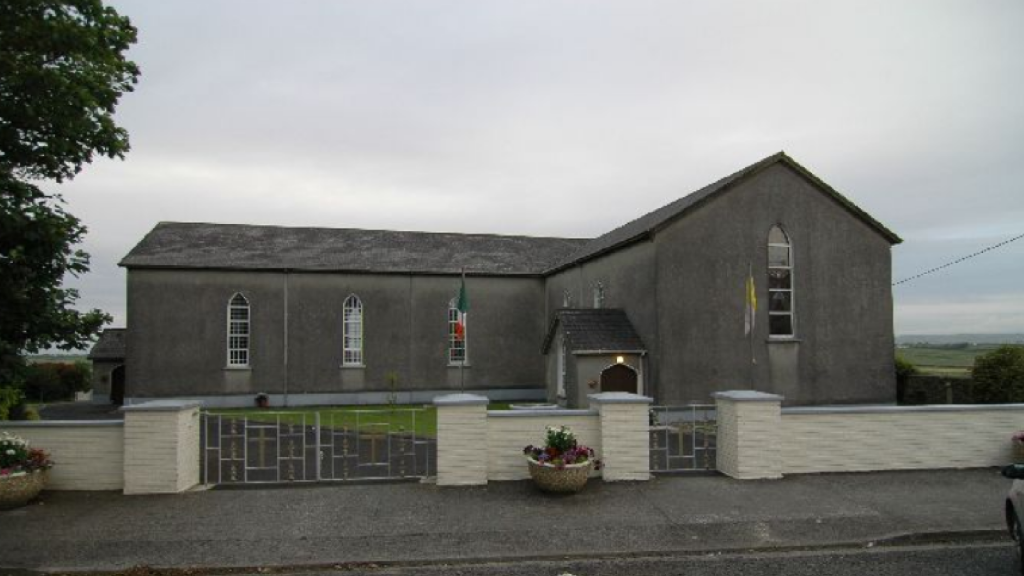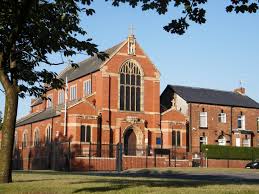Churches of the Day
Pictorial Thought for Today

May 6 - St Hilary of Arles (401-449)
Patrick Duffy tells what is known about him.
Early life
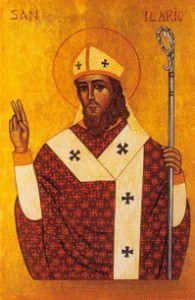 As a youth Hilary, though still a pagan, entered the island abbey of Lérins (opposite present-day Cannes) which had been founded by his relative Honoratus. Here he had an education in rhetoric and when he became a Christian, he joined the ranks of the monks. When Honoratus became bishop of Arles in 426 Hilary accompanied him to that city.
As a youth Hilary, though still a pagan, entered the island abbey of Lérins (opposite present-day Cannes) which had been founded by his relative Honoratus. Here he had an education in rhetoric and when he became a Christian, he joined the ranks of the monks. When Honoratus became bishop of Arles in 426 Hilary accompanied him to that city.Bishop of Arles
Honoratus died after three years, and Hilary went back to Lerins. But messengers followed him to tell him he had been chosen as bishop of that city. Somewhat like St Augustine, Hilary organised his cathedral clergy into a monastic community, himself taking part in manual work and helping the poor.
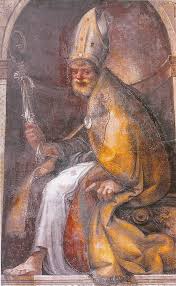
Was He a Metropolitan?
Believing that the authority of a metropolitan had been given to the predecessor of Honoratus, Proclus, Hilary deposed Bishop Chelidonius of Besançon for ignoring his primacy. Chelidonius appealed to Pope Leo in Rome, and was reinstated. Leo withdrew Hilary's jurisdiction as a metropolitan, asserting - with the approval of the emperor Valentinian III (425-455) - the primacy of the see of Rome over the Gallican church: ut episcopis Gallicanis omnibusque pro lege esset quidquid apostolicae sedis auctoritas sanxisset ("that the authority of the apostolic see must sanction whatever is to be the law for the Gallican bishops").
Death and Writings
Hilary died in 449. He wrote a Life of Honoratus, which survives, along with some letters and some poetry. A poem, De providentia, attributed to him, is sometimes included among the writings of Prosper of Aquitaine.
The Island of Lerins
Lerins was an important influence on the Irish church, with a tradition that St Patrick received at least a part of his formation there. After World War II, the Cistercians re-opened a monastery on the island, which remains to this day.
Monday of the Sixth Week of Easter
FIRST READING
A reading from the Acts of the Apostles 16:11-15
The Lord opened her heart to accept what Paul was saying.
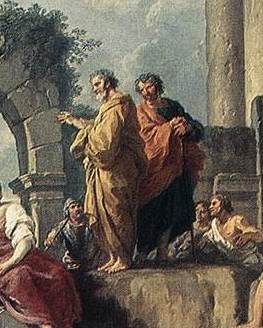 Sailing from Troas we made a straight run for Samothrace; the next day for Neapolis, and from there for Philippi, a Roman colony and the principal city of that particular district of Macedonia. After a few days in this city we went along the river outside the gates as it was the sabbath and this was a customary place for prayer. We sat down and preached to the women who had come to the meeting. One of these women was called Lydia, a devout woman from the town of Thyatira who was in the purple-dye trade. She listened to us, and the Lord opened her heart to accept what Paul was saying. After she and her household had been baptised she sent us an invitation:
Sailing from Troas we made a straight run for Samothrace; the next day for Neapolis, and from there for Philippi, a Roman colony and the principal city of that particular district of Macedonia. After a few days in this city we went along the river outside the gates as it was the sabbath and this was a customary place for prayer. We sat down and preached to the women who had come to the meeting. One of these women was called Lydia, a devout woman from the town of Thyatira who was in the purple-dye trade. She listened to us, and the Lord opened her heart to accept what Paul was saying. After she and her household had been baptised she sent us an invitation:'If you really think me a true believer in the Lord,' she said 'come and stay with us';
and she would take no refusal.
The Word of the Lord. Thanks be to God
Responsorial Psalm Ps 149
Response The Lord takes delight in his people.
Or Alleluia!
1. Sing a new song to the Lord, his praise in the assembly of the faithful.
Let Israel rejoice in its Maker, let Zion's sons exult in their king. Response
2. Let them praise his name with dancing and make music with timbrel and harp.
For the Lord takes delight in his people. He crowns the poor with salvation. Response
3. Let the faithful rejoice in their glory, shout for joy and take their rest.
Let the praise of God be on their lips: this honour is for all his faithful. Response
Gospel Acclamation Lk 24: 46. 26.
Alleluia, alleluia!
It was ordained that the Christ should suffer and rise from the dead,
and so enter into his glory.
Alleluia!
or Jn 15: 26 - 27
Alleluia, alleluia!
The Spirit of truth will be my witness, and you too will be witnesses, says the Lord.
Alleluia!
GOSPEL
The Lord be with you. And with your spirit
A reading from the holy Gospel according to John 15:26-16:4 Glory to you, O Lord
The Spirit of truth will be my witness.
Jesus said to his disciples:
'When the Advocate comes,
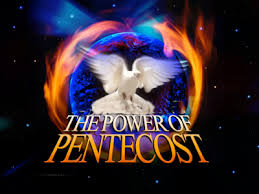 whom I shall send to you from the Father,
whom I shall send to you from the Father,the Spirit of truth who issues from the Father, he will be my witness.
And you too will be witnesses, because you have been with me from the outset.
'I have told you all this that your faith may not be shaken. They will expel you from the synagogues, and indeed the hour is coming when anyone who kills you will think he is doing a holy duty for God.
They will do these things because they have never known either the Father or myself. But I have told you all this, so that when the time for it comes you may remember that I told you.
The Gospel of the Lord. Praise to you, Lord Jesus Christ.
Gospel Reflection Monday, Sixth Week of Easter John 15:26-16:4
Today’s first reading describes a significant moment in the spread of the gospel in the early church. For the first time, Paul preaches the gospel in the equivalent of modern day Greece, which is the continent of Europe. The first people to hear the gospel on European soil from Paul, according to our first reading, were a group of devout women who gathered for prayer on the Sabbath outside the gates of the city of Philippi. One member of that group, a woman named Lydia, responded wholeheartedly to Paul’s preaching of the gospel. She was clearly a woman of some means. She was involved in the purple dye trade. Purple cloth was the most expensive cloth at the time. She had the financial means to offer Paul hospitality and she insisted that Paul accept her offer; it was her way of giving thanks to God for what she had received through Paul. People who get involved in parish ministry often say that they want to give something back. They are conscious that they have received a great deal in life and they want to give from what they have received. Lydia had no sooner received the gospel than she engaged in the ministry of hospitality. This was her way of bearing witness to her faith, of giving back.
In the gospel reading, Jesus calls on his disciples to become his witnesses and he promises to send them the Holy Spirit who is Jesus’ primary witness. It is the Holy Spirit who empowers us to witness to our faith. It was the Holy Spirit who moved Lydia to witness to her new found faith by offering hospitality to Paul and his companions. The Holy Spirit will always be inspiring us to witness to our faith in various ways. We need to be attentive to the ways the Holy Spirit may be inspiring us to be the Lord’s witnesses in the world.
__________________________________
The Scripture Readings are taken from The Jerusalem Bible, published 1966 by Darton, Longman & Todd Ltd. and used with the permission of the publishers. http://dltbooks.com/
The Scripture Reflection is made available with our thanks from his book Reflections on the Weekday Readings 2024: The Word is near to you, on your lips and in your heart by Martin Hogan and published by Messenger Publications 2022/23, c/f www.messenger.ie/bookshop/
________________________________________________
Sliocht as Gníomhartha na nAspal 16:11-15
D'oscail an Tiarna a croí go dtabharfadh sí cluas dá raibh á rá ag Pól.
 Chuamar ar bord loinge i dTróas agus ceann ar aghaidh as sin go Samotráicé agus an lá ina dhiaidh sin go Neapoil agus as sin go Filipí. Príomhchathair den taobh sin den Mhacadóin is ea Filipí agus coilíneacht Rómhánach is ea í freisin. Thugamar roinnt laethanta sa chathair sin. Lá na sabóide chuamar amach lasmuigh den gheata, cois abhann, áit a mheasamar a mbeadh láthair urnaithe na nGiúdach agus shuíomar fúinn ag caint leis na mná a bhí bailithe le chéile ann. Bhí bean ag éisteacht linn, mangaire corcra ó chathair Tíaitíora darbh ainm Lidia. Bean chráifeach ba ea í agus d’oscail an Tiarna a croí go dtabharfadh sí cluas dá raibh á rá ag Pól. Baisteadh í féin agus a teaghlach agus ansin rinne sí tathant orainn, á rá:
Chuamar ar bord loinge i dTróas agus ceann ar aghaidh as sin go Samotráicé agus an lá ina dhiaidh sin go Neapoil agus as sin go Filipí. Príomhchathair den taobh sin den Mhacadóin is ea Filipí agus coilíneacht Rómhánach is ea í freisin. Thugamar roinnt laethanta sa chathair sin. Lá na sabóide chuamar amach lasmuigh den gheata, cois abhann, áit a mheasamar a mbeadh láthair urnaithe na nGiúdach agus shuíomar fúinn ag caint leis na mná a bhí bailithe le chéile ann. Bhí bean ag éisteacht linn, mangaire corcra ó chathair Tíaitíora darbh ainm Lidia. Bean chráifeach ba ea í agus d’oscail an Tiarna a croí go dtabharfadh sí cluas dá raibh á rá ag Pól. Baisteadh í féin agus a teaghlach agus ansin rinne sí tathant orainn, á rá:“Má mheasann sibh go bhfuilim dílis don Tiarna,
tagaigí isteach agus bainigí fúibh i mo theachsa.”
Agus chuir sí d’fhiacha orainn dul isteach.
Briathar an Tiarna Buíochas le Dia
Salm le freagra Sm 149
Freagra Óir tugann an Tiarna taitneamh dá phobal.
Malairt le freagra Alleluia!
1. Canaigí amhrán nua don Tiarna; moltar é i gcomhthionól na bhfíréan.
Déanadh Iosrael gairdeas faoina gcruthaitheoir; bíodh ríméad ar chlann Shíón faoina Rí.
Freagra
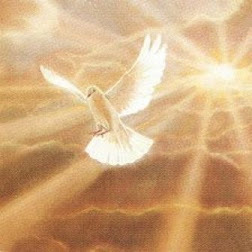
2. Molaidís a ainm le rince; déanaidís ceol ar an gcláirseach is ar an gcruit.
Óir tugann an Tiarna taitneamh dá phobal; tugann sé an bua do lucht na huirísle. Freagra
3. Bíodh mórmholtaí Dé ina mbéal acu; agus claíomh an dá fhaobhar ina láimh.
D’fhonn breithiúnas a chur i bhfeidhm mar a ceapadh dóibh;
is í an ghlóir seo atá i ndán dá naoimh uile. Freagra
SOISCÉAL
Go raibh an Tiarna libh. Agus le do spiorad féin
Sliocht as an Soiscéal naofa de réir Naomh Eoin 15:26-16:4 Glóir duit, a Thiarna.
Spiorad na Fírinne déanfaidh sé fianaise orm.
San am sin dúirt Íosa lena dheisceabail:
Nuair a thiocfaidh an tAbhcóide a chuirfidh mé chugaibh ón Athair,
Spiorad na Fírinne a ghluaiseann ón Athair, déanfaidh sé fianaise orm.

Déanann sibhse fianaise freisin, mar bhí sibh in éineacht liom ó thosach.
D’inis mé an méid sin daoibh, ionas nach nglacfaidh sibh scannal.
Dúnfar amach as na sionagóga sibh; tá an t-am ag teacht, fiú amháin,
nuair a shílfidh an té a mharóidh sibh gur ag déanamh réir Dé a bhíonn.
Agus déanfaidh siad an méid sin [oraibh] de bhrí nach bhfuil aithne acu
ar an Athair ná ormsa.
D’inis mé an méid sin daoibh ionas go mbeadh cuimhne agaibh,
nuair a thiocfaidh an t-am dó, gur inis mé daoibh é.
Ní dúirt mé na nithe seo libh ó thus mar bhí mé in bhur bhfochair.
Soiscéal an Tiarna. Moladh duit, a Chriost
AN BÍOBLA NAOFA
© An Sagart
The Ascension of the Lord-Year B
World Communications Day
‘The Ascension of Christ means our own salvation as well ;
where the glorious Head has gone before, the body is called to follow in hope.
Let us therefore exult, beloved and let us rejoice in devout thanksgiving.
For on this day not only have we been confirmed in our possession of paradise,
but we have even entered heaven in the person of Christ;
through his grace we have regained far more than we had lost through the devil’s hatred’
This week of prayer for the coming of the Holy Spirit recalls the waiting in prayer of the disciples with Mary.
FIRST READING
A reading from the Acts of the Apostles 1:1-11
He was lifted up while they looked on.
In my earlier work, Theophilus, I dealt with everything Jesus had done and I taught from the beginning until the day he gave his instructions to the apostles he had chosen through the Holy Spirit, and was taken up to heaven. He had shown himself alive to them after his Passion by many demonstrations: for forty days he had continued to appear to them and tell them about the kingdom of God. When h
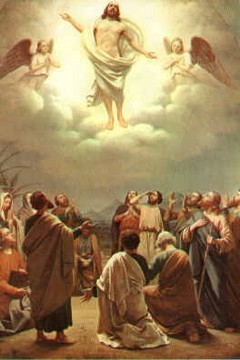 e had been at table with them, he had told them not to leave Jerusalem, but to wait there for what the Father had promised.
e had been at table with them, he had told them not to leave Jerusalem, but to wait there for what the Father had promised.'It is' he had said 'what you have heard me speak about: John baptised with water but you, not many days from now, will be baptised with the Holy Spirit.'
Now having met together, they asked him, 'Lord, has the time come? Are you going to restore the kingdom to Israel?'
He replied, 'It is not for you to know times or dates that the Father has decided by his own authority, but you will receive power when the Holy Spirit comes on you, and then you will be my witnesses not only in Jerusalem but throughout Judaea and Samaria, and indeed to the ends of the earth.'
As he said this he was lifted up while they looked on, and a cloud took him from their sight. They were still staring into the sky when suddenly two men in white were standing near them and they said,
'Why are you men from Galilee standing here looking into the sky?
Jesus who has been taken up from you into heaven,
this same Jesus will come back in the same way as you have seen him go there.'
The Word of the Lord. Thanks be to God
Responsorial Psalm Ps 46:2-3, 6-9 R/v6
Response God goes up with shouts of joy;
the Lord goes up with trumpet blast.
or Alleluia!
1. All peoples, clap your hands, cry to God with shouts of joy!
For the Lord, the Most High, we must fear, great king over all the earth. Response
2. God goes up with shouts of joy; the Lord goes up with trumpet blast.
Sing praise for God, sing praise, sing praise to our king, sing praise. Response
3. God is king of all the earth. Sing praise with all your skill.
God is king over the nations; God reigns on his holy throne. Response
SECOND READING
A reading from the letter of St Paul to the Ephesians 1:17-23
He made him sit at his right hand, in heaven.
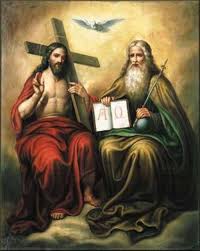 May the God of our Lord Jesus Christ, the Father of glory, give you a spirit of wisdom and perception of what is revealed, to bring you to full knowledge of him.
May the God of our Lord Jesus Christ, the Father of glory, give you a spirit of wisdom and perception of what is revealed, to bring you to full knowledge of him.May he enlighten the eyes of your mind so that you can see what hope his call holds for you, what rich glories he has promised the saints will inherit and how infinitely great is the power that he has exercised for us believers. This you can tell from the strength of his power at work in Christ, when he used it to raise him from the dead and to make him sit at his right hand, in heaven, far above every Sovereignty, Authority, Power, or Domination, or any other name that can be named not only in this age but also in the age to come. He has put all things under his feet and made him, as the ruler of everything, the head of the Church; which is his body, the fullness of him who fills the whole creation.
The Word of the Lord. Thanks be to God
___________________________________________________________________
Optional (shorter) Second Reading, for Year B Ephesians 4:1-7, 11-13
Fully mature with the fullness of Christ.
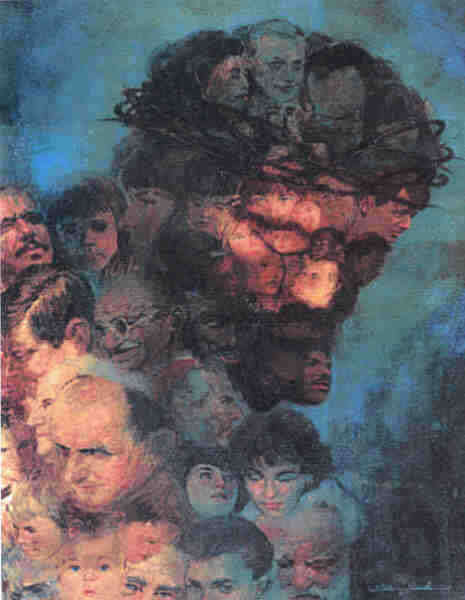 I, the prisoner in the Lord, implore you to lead a life worthy of your vocation. Bear with one another charitably, in complete selflessness, gentleness and patience. Do all you can to preserve the unity of the Spirit by the peace that binds you together.
I, the prisoner in the Lord, implore you to lead a life worthy of your vocation. Bear with one another charitably, in complete selflessness, gentleness and patience. Do all you can to preserve the unity of the Spirit by the peace that binds you together.There is one Body, one Spirit, just as you were all called into one and the same hope when you were called.
There is one Lord, one faith, one baptism, and one God who is Father of all, over all, through all and within all.
Each one of us, however, has been given his own share of grace, given as Christ allotted it. It was said that he would: When he ascended to the height, he captured prisoners, he gave gifts to men.
When it says, ‘he ascended’, what can it mean if not that he descended right down to the lower regions of the earth? The one who rose higher than all the heavens to fill all things is none other than the one who descended. And to some, his gift was that they should be apostles; to some, prophets; to some, evangelists; to some, pastors and teachers; so that the saints together make a unity in the work of service, building up the body of Christ. In this way we are all to come to unity in our faith and in our knowledge of the Son of God, until we become the perfect Man, fully mature with the fullness of Christ himself.
The Word of the Lord. Thanks be to God
__________________________________________________________
Gospel acclamation Mt 28: 19
Alleluia, alleluia!
Go, make disciples of all the nations; I am with you always; yes, to the end of time.
Alleluia!
GOSPEL
The Lord be with you And with your spirit.
A reading from the holy Gospel according to Mark 16:15-20 Glory to you, O Lord
He was taken up into heaven: there at the right hand of God he took his place.
Jesus showed himself to the Eleven, and said to them,
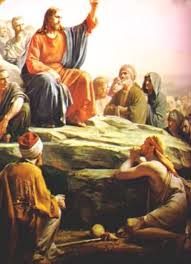 'Go out to the whole world; proclaim the Good News to all creation. He who believes and is baptised will be saved; he who does not believe will be condemned. These are the signs that will be associated with believers:
'Go out to the whole world; proclaim the Good News to all creation. He who believes and is baptised will be saved; he who does not believe will be condemned. These are the signs that will be associated with believers:in my name they will cast out devils;
they will have the gift of tongues;
they will pick up snakes in their hands, and be unharmed should they drink deadly poison; they will lay their hands on the sick, who will recover.'
And so the Lord Jesus, after he had spoken to them, was taken up into heaven:
here at the right hand of God he took his place,
while they, going out, preached everywhere,
the Lord working with them and confirming the word by the signs that accompanied it.
The Gospel of the Lord. Praise to you, Lord Jesus Christ.
****************************
For homily resources for this Sunday's Gospel click here: https://www.catholicireland.net/sunday-homily/
Taken from THE JERUSALEM BIBLE, published and copyright 1966 by Darton, Longman and Todd Ltd and Doubleday, a division of Random House Inc, and used by permission of the publishers.
Sliocht as Leabhar Gníomhartha na nAspal 1:1-11
Agus iad ag faire, tógadh suas é.
Thug mé cuntas cheana, a Theofail, ar gach a ndearna Íosa agus ar ar thug sé de theagasc uaidh ó thús go dtí an lá a tógadh suas ar neamh é, tar éis dó a chuid orduithe a thabhairt le cabhair an Spioraid Naoimh do na haspail a bhí tofa aige. i ndiaidh a pháise is iomaí cruthú a thug sé dóibh go raibh sé beo, á nochtadh féin dóibh ar feadh daichead lá agus ag cur síos ar ríocht Dé.
 Uair dá raibh sé ina gcuibhreann d’ordaigh sé dóibh gan corraí ó Iarúsailéim ach fanacht ann go dtí go gcomhlíonfaí gealltanas an Athar,
Uair dá raibh sé ina gcuibhreann d’ordaigh sé dóibh gan corraí ó Iarúsailéim ach fanacht ann go dtí go gcomhlíonfaí gealltanas an Athar,“An gealltanas úd,” ar sé, “ar chuala sibh mé ag trácht air: rinne Eoin baisteadh le huisce, ach déanfar sibhse a bhaisteadh leis an Spiorad Naomh i gceann beagán laethanta.”
Más ea, nuair a bhí siad cruinnithe le chéile, thosaigh siad á cheistiú: “A Thiarna,” ar siad, “an anois atá tú chun ríocht Iosrael a athbhunú?”
Ach d’fhreagair sé iad:
“Ní aon chuid de bhur ngnósa é eolas a fháil ar na hamanna na ar na tráthanna atá leagtha amach ag an Athair as a údarás féin. Ach gheobhaidh sibh neart an Spioraid Naoimh atá le tuirlingt oraibh agus beidh sibh in bhur bhfinnéithe ormsa in Iarúsailéim agus ar fud Iúdáia go léir agus na Samáire agus a fhad le himeall an domhain.”
Ar rá an méid sin dó, tógadh suas os comhair a súl é agus d’ardaigh scamall as a radharc é. Fad a bhí siad ag stánadh in airde sa spéir ina dhiaidh sheas beirt fhear in éadaí bána ina n-aice.
“Afheara na Gailíle,” ar siad, “cad ab áil libh in bhur seasamh ansin ag amharc in airde sa spéir?
An Íosa seo a tógadh suas ar neamh uaibh, tiocfaidh sé an tslí chéanna ina bhfaca sibh ag dul suas é.”
Briathar an Tiarna Buíochas le Dia
Salm le Freagra Sm 46
Freagra Gabhann Dia in airde le gártha molta;
gabhann sé in airde le séideadh an stoic.
Malairt Freagra Alleluia!
I. Buailigí bhur mbosa, a chiníocha uile, gairdigí do Dhia Ie teann lúcháire!
Óir is ard é an Tiarna agus is uamhnach, ina ardrí os cionn na cruinne. Freagra
2. Gabhann Dia in áirde le gártha molta; gabhann sé in airde le séideadh an stoic.
Seinntear ceol dár nDia; seinntear ceol dó Seinntear ceol dár rí; seinntear ceol dó. Freagra
3. Is é Dia rí na cruinne go léir. Seinnigí agus canaigí ar bhur ndíheall dó
Tá Dia ina rí ar na náisiúin; tá sé ina shuí ar a chathaoir naofa. Freagra
Alleluia Véarsa Mth 28: 19-20
Alleluia, Alleluia!
Imigí, deanaigí deisceabail de na nárisiúin uile,' a deir an Tiarna;
'Táim in éineacht libh i gcónai go dtí deireadh an tsaoil.'
Alleluia!
DARA LÉACHT
Sliocht as Litir N.Pól chuig na hEifísigh 1:17-23
Chuir sé ina shuí ar a dheis féin sna flaithis é.
 A bhráithre, bím á iarraidh ar Dhia ár dTiarna Íosa Críost, ar Athair na Glóire, spiorad na heagna agus na géarchúise a thabhairt daoibh chun go gcuirfeadh sibh aithne air. Go soilsítear súile bhur n-aigne ar shlí go dtuigfidh sibh cad é mar údar dóchais daoibh bhur ngairm aige agus cad é mar oidhreacht fhairsing ghlórmhar atá aige i ndán don phobal naofa agus ollmhaitheas na cumhachta a chuir sé i bhfeidhm ar ár son-na, creidmhigh – an chumhacht éachtach úd a chuir sé ag obair i gCríost nuair a thóg sé ó mhairbh é agus chuir ina shuí ar a dheis sna flaithis é go hard os cionn gach ceannas agus údarás agus cumhacht agus tiarnas agus os cionn gach ainm dar féidir a ainmniú ní sa saol seo amháin é ach sa saol atá le teacht chomh maith. Agus chuir sé gach ní faoina smacht agus cheap é, os cionn gach ní, ina cheann ar an Eaglais is corp dó agus arb í iomláine an té úd a líonann gach ní go hiomlán í.
A bhráithre, bím á iarraidh ar Dhia ár dTiarna Íosa Críost, ar Athair na Glóire, spiorad na heagna agus na géarchúise a thabhairt daoibh chun go gcuirfeadh sibh aithne air. Go soilsítear súile bhur n-aigne ar shlí go dtuigfidh sibh cad é mar údar dóchais daoibh bhur ngairm aige agus cad é mar oidhreacht fhairsing ghlórmhar atá aige i ndán don phobal naofa agus ollmhaitheas na cumhachta a chuir sé i bhfeidhm ar ár son-na, creidmhigh – an chumhacht éachtach úd a chuir sé ag obair i gCríost nuair a thóg sé ó mhairbh é agus chuir ina shuí ar a dheis sna flaithis é go hard os cionn gach ceannas agus údarás agus cumhacht agus tiarnas agus os cionn gach ainm dar féidir a ainmniú ní sa saol seo amháin é ach sa saol atá le teacht chomh maith. Agus chuir sé gach ní faoina smacht agus cheap é, os cionn gach ní, ina cheann ar an Eaglais is corp dó agus arb í iomláine an té úd a líonann gach ní go hiomlán í.Briathar an Tiarna Buíochas le Dia
SOISCÉAL
Sliocht as an Soiscéal naofa de réir Naomh Marcas 16:15-20
Tógadh suas ar neamh é, agus chuaigh sé chun suí ar dheasláimh Dé.
San am sin thaispeáin Íosa é féin don aonar déag agus iad ag bord, agus d’athchas sé leo a ndíchreideamh agus stuacacht a gcroí, mar nár chreid siad an mhuintir a chonaic é aiséirithe.
Agus dúirt sé leo:
 “Imígí faoin domhan uile agus fógraígí an soiscéal don chruthaíocht uile. An té a chreidfidh agus a bhaistfear, slánófar é; ach an té nach gcreidfidh, daorfar é. “Agus leanfaidh na comharthaí seo an dream a chreideann: caithfidh siad deamhain amach i m’ainmse, labhróidh siad i dteangacha nua; tógfaidh siad nathracha ina lámha, agus má ólann siad aon deoch mharfach, ní dhéanfaidh sí díobháil dóíbh; leagfaidh siad a lámha ar easláin, agus beidh siad ar fónamh.”
“Imígí faoin domhan uile agus fógraígí an soiscéal don chruthaíocht uile. An té a chreidfidh agus a bhaistfear, slánófar é; ach an té nach gcreidfidh, daorfar é. “Agus leanfaidh na comharthaí seo an dream a chreideann: caithfidh siad deamhain amach i m’ainmse, labhróidh siad i dteangacha nua; tógfaidh siad nathracha ina lámha, agus má ólann siad aon deoch mharfach, ní dhéanfaidh sí díobháil dóíbh; leagfaidh siad a lámha ar easláin, agus beidh siad ar fónamh.”Tar éis dó labhairt leo, dá bhrí sin, tógadh an Tiarna Íosa suas ar neamh, agus chuaigh sé chun suite ar dheasláimh Dé. Ach iad siúd, d’imigh siad leo agus chraobhscaoil siad i ngach áit, agus chabhraigh an Tiarna leo ag neartú an bhriathair lei a comharthaí a lean é.
Soiscéal an Tiarna. Moladh duit, a Chriost
AN BÍOBLA NAOFA
© An Sagart
************************************
Machtnamh ar Bhriathar Dé dia Domhnaigh Tuirlingt ár dTiarna ó Neamh
Tiomna Déanach ár dTiarna
B'Fhuras an misean a thug sé dóibh a thuiscint ach deacair a chur i gcríoch. Sé a bhí i gceist daoine a theagasc d'réir mar a mhúin Sé dóibh. D'réir mar a d'iarr sé ar a dheisceabail cloí leis, bhí orthusan daoine eile a mhealladh chun cloí lena threoracha chomh maith. Ní mór don chlár athraithe agus slándála dul ó glún go glún, go dtí claochlú an domhain. Leis na hathruithe go léir atá tagtha i saol na heaglaise agus iad siúd atá le teacht amach anso, ní raibh agus ní bheidh aon athrú ar dhá rud: Íosa é féin, agus a theachtaireacht grásta agus trócaire. Is buan iad an Teachtaireacht agus an Teachtaire, agus níl athrú i ndán dóibh. Ba chóir do dhaoine a bhfuil imní orthu faoi athruithe san eaglais agus atá i ndán di amach anso gur féidir bheith muiníneach as bunghnéithe a an chreidimh. Tá Sé le linn i gcónaí ... agus a misean is ár misean é freisin. Mar adeir an file: "Scríobhann tú leathnach úr den soiscéal gach lá, / trí na rudaí a dhéanann tú is na briathra a deireannn tú / bí deimhin de go bhfuil do scríobhainní seasamhach agus fíor / Mar sin de cad é do shoiscéal?"
Pádraig Ó Rúairí, cp, Sliabh Argus, Átha Cliath.
********************************************


